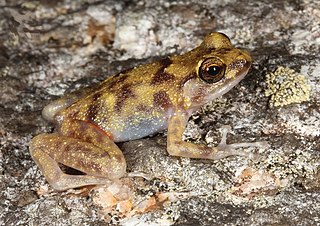
Caledoniscincus is a genus of lizards in the family Scincidae (skinks). The genus is endemic to New Caledonia.

Carlia is a genus of skinks, commonly known as four-fingered skinks or rainbow skinks, in the subfamily Eugongylinae. Before being placed in this new subfamily, Carlia was recovered in a clade with the genera Niveoscincus, Lampropholis, and others of the Eugongylus group within Lygosominae.
Glaphyromorphus is a genus of lizards in the skink family (Scincidae).

Lampropholis is a genus of skinks, commonly known as sunskinks, in the lizard subfamily Eugongylinae of the family Scincidae. The genus Lampropholis was previously found to belong to a clade with the genera Niveoscincus, Leiolopisma and others of the Eugongylus group within Lygosominae. All species of Lampropholis are endemic to Australia. For similar skinks see genera Bassiana, Pseudemoia, and Niveoscincus.
Lygisaurus is a genus of skinks, lizards in the family Scincidae.

Cophixalus is a genus of microhylid frogs. These are arboreal species with expanded toe-pads, endemic to Moluccan Islands, New Guinea and northeastern Queensland, Australia.

Cape Melville is a headland on the eastern coast of the Cape York Peninsula in Australia. To its west lies Princess Charlotte Bay. It is part of the Cape Melville National Park. Cape Melville was named Stoney Cape in 1815 by Lieutenant Charles Jeffreys on the HM Kangaroo but later renamed by him as Cape Melville
Techmarscincus is a genus of skink, a lizard in the family Scincidae. The genus is endemic to Australia, and is monotypic, containing the sole species Techmarscincus jigurru.

Saproscincus mustelinus, commonly known as the southern weasel skink or weasel shadeskink, is a small species of skink which is endemic to Australia.
The Cape Melville shadeskink is a species of lizards from the Cape York Peninsula of Queensland, Australia, described in 2013. It was one of three vertebrates discovered by scientists from James Cook University and National Geographic in an area of mountain rainforest in North Queensland. The lizards are active by day, running and jumping through the mossy boulder fields of Northern Queensland.

Cophixalus petrophilus, the blotched boulder-frog, is a species of frogs from the Cape York Peninsula that was described in 2013. It is one of three newly described vertebrate species from Cape Melville, Australia, the other two being skink Saproscincus saltus and gecko Saltuarius eximius. The specific name petrophilus means "rock-loving" and refers to restriction of this species to boulder field habitats.
Ctenotus quinkan, the Quinkan ctenotus, is a species of Australian skink, a lizard in the family Scincidae.
Pygmaeascincus is a genus of skinks, lizards in the family Scincidae. All member species are endemic to Australia.
Lyon's snake-eyed skink is a species of lizard in the family Scincidae. The species is endemic to Queensland in Australia.

Carlia jarnoldae, also known commonly as the lined rainbow-skink or the lined rainbow skink, is a species of lizard in the subfamily Eugongylinae of the family Scincidae. The species is endemic to the state of Queensland in Australia.
Lygisaurus tanneri, also known commonly as the Endeavour River litter-skink and Tanner's four-fingered skink, is a species of lizard in the family Scincidae. The species is endemic to Australia.

Saproscincus challengeri, also known commonly as the Border Ranges shadeskink, Challenger's skink, the challenging shade skink, and the orange-tailed shadeskink, is a species of lizard in the family Scincidae. The species is native to New South Wales and Queensland in Australia.

Saproscincus czechurai, also known commonly as Czechura's litter-skink, Czechura's skink, and the wedge-snouted shadeskink, is a species of lizard in the family Scincidae. The species is endemic to Queensland in Australia.
Saproscincus hannahae, also known commonly as Hannah's shadeskink and Hannah's shade-skink, is a species of lizard in the family Scincidae. The species is endemic to Queensland in Australia.
Saproscincus lewisi, also known commonly as the Cooktown shade-skink and the northern wet tropics shadeskink, is a species of lizard in the subfamily Eugongylinae of the family Scincidae. The species is endemic to Queensland in Australia.









